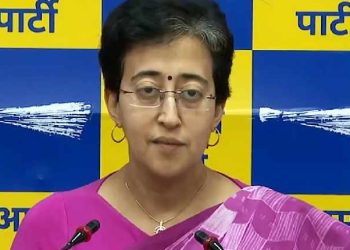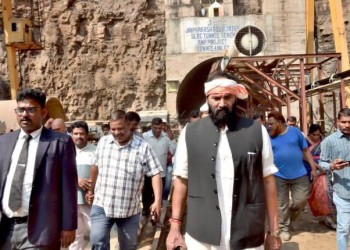New Delhi: Five years after the death of India’s first Prime Minister Jawaharlal Nehru, a premier research university was established in his name by an act of Parliament in 1969.
During the discussion in the Lok Sabha, parliamentarian Bhushan Gupta voiced the opinion that this should not be yet another university. New faculties should be created, including scientific socialism, and one thing that this university should ensure was to keep noble ideas in mind.
However, 50 years after its formation, Jawaharlal Nehru University, with each passing day is becoming an epicentre, a podium and a battlefield of the Left Vs Right politics that is often marred by incidents of violence.
Just a day ago on April 10, the University once again bore witness to bloodshed between warring camps. As many as 16 students were injured during a fight that allegedly started over consumption of non vegetarian food on the occasion of Ram Navami.
Minor scuffles do take place in universities but Sunday’s incident was not the first time that the students-turned-miscreants became thirsty for each other’s blood inside the campus.
In January 2020, masked men and women carrying sticks and rods barged into the hostels of the University, attacking students and teachers. The campus property was damaged. Nearly 30 students, including JNUSU president Aishe Ghosh were injured in the incident.
The scale of violence was such that the administration was forced to call the police which had to conduct a march inside the campus. Several left leaning political parties blamed the Akhil Bharatiya Vidyarthi Parishad for allegedly creating mayhem, however, nothing has been proved even after two years of the incident.
It was not a fight for prestige between students, as is usually seen at other universities in the country, rather the violence was a result of Left and Right politics.
The JNU has always been a hotbed of politics and the politicians, both left and right, have a keen interest in whatever transpires within the campus walls. JNU is probably one of the most used words during election campaigns.
But the varsity received serious political attention after February 9, 2016 when the ‘Azadi’ slogans rent the air of the campus.
Some alleged anti-India, anti-judiciary slogans raised there in 2016, after six years still become the main point in TV debates. The term ‘Tukde-Tukde gang’ is often used to brand the left leaning alliances in JNU. It was coined after those slogans were raised.
Interestingly, the Union Ministry of Home Affairs in an RTI reply in January 2020, had said that it has “no information” concerning the ‘Tukde Tukde Gang’ — a term that has been used by Prime Minister Narendra Modi and Union Home Minister Amit Shah themselves.
Apart from all the misadventures that have taken place in the University, according to the National Institutional Ranking Framework (NIRF) — the central government’s ranking for higher educational institutions in the country — JNU is still the second topmost university in India.
(IANS)
















